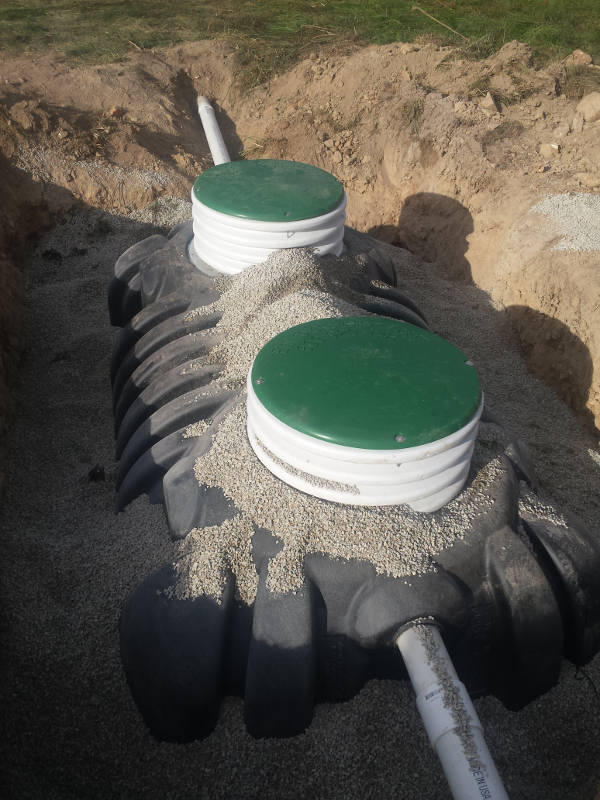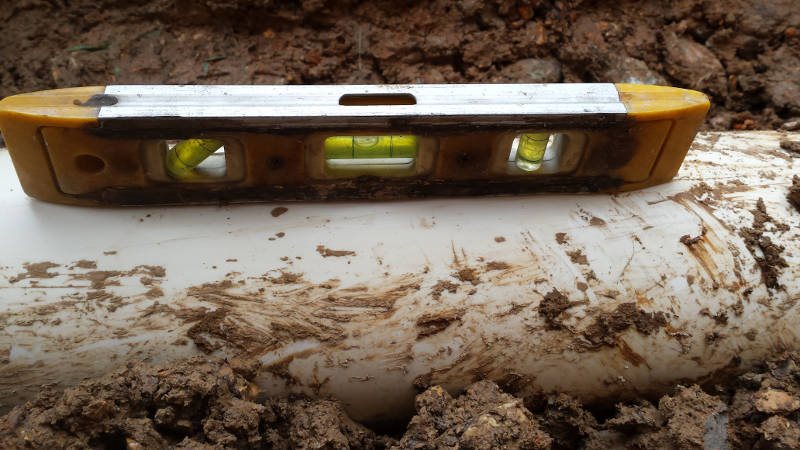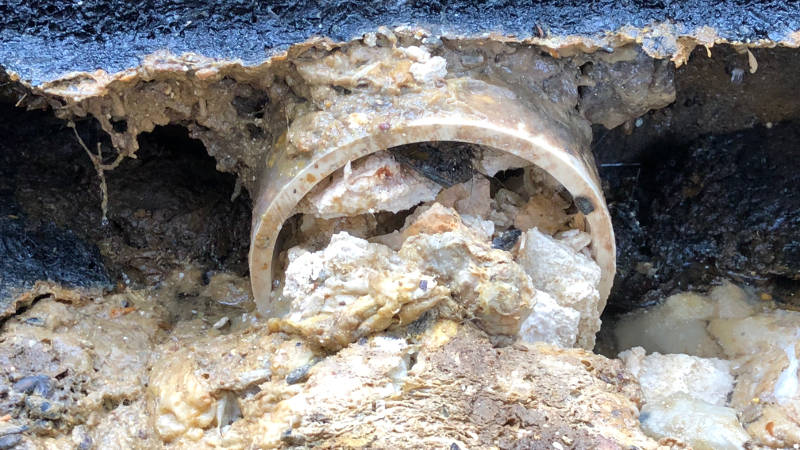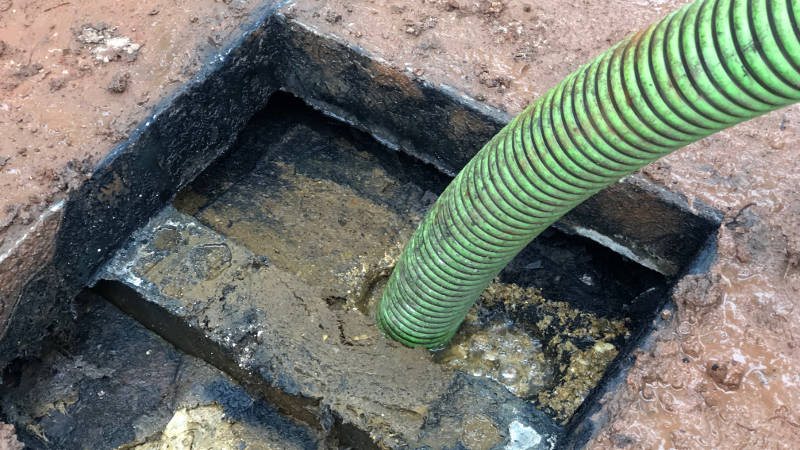Why Pumping Your Tank May Not Solve Your Problem
Have you ever wondered how your septic tank is designed to work? If you notice problems, do you automatically assume that you need your tank pumped?
We've put together some information on how your tank is designed to function as well as common issues that may lead you to believe that pumping out your septic tank is going to solve your real problem.
Septic Tank Inlet & Outlet Pipes

How They Work
Other than the top, a septic tank is generally designed with two holes on each end. One for an inlet pipe and the other for the outlet pipe.
The inlet piping is what connects from your home's plumbing that feeds into the tank. The outlet piping is what disperses the effluent (liquid wastewater) into your lateral field piping.
Common problems with inlet & outlet pipes.
If both the inlet and outlet pipes inside your tank are not configured correctly, then this can cause solids inside your tank to block these entry and exit points. Often, this problem leads homeowners to believe they need their tank pumped.
With our service, we make sure that both the inlet and outlet piping are configured correctly to prevent this from happening.
Tank, Pipe & Lateral Line Elevations


The Importance Of Elevations
The elevation of your septic tank and the components attached to it are crucial ingredients to functionality.
A common sense understanding, but an often overlooked consideration is that your outlet pipes should be at a lower elevation than your inlet pipes. This simply allows the waste to enter your tank and exit your tank efficiently.
Common problems with elevations.
Unfortunately, we often find that tanks and their components are not always at their proper elevations. This is usually due to improper installation methods or a lack of care during the original installation.
Some reasons why elevations can eventually fluctuate…
- No compaction was used during the installation
- A lack of gravel used to bed around crucial components like the tank and pipes
- The initial excavation wasn't calculated properly
As a result of improper elevations it causes back up issues which can cause solids to enter the lateral field, thus causing homeowners again to assume their tank needs pumped.
We can offer a variety of solutions to fix and correct any type of issue if your tank isn't designed correctly. This will help limit future pumping requirements.
Septic Tank Additives: What you should know!
You might be one of many homeowners who have tried various methods to help reduce the need for septic tank pumping by using septic tank additives. Unfortunately, most never really know whether the products they have added to their tank have actually had any benefit.
Unless you have gone to the effort of monitoring specific sampling locations within your system, then you can only base your results on whether you've had any backups.
Not having any backups does not mean that excessive solids have not been leaving your septic tank. Solids can and will accumulate within the lateral field and clog the soil particles, which eventually leads to common issues like slow drains or toilets backing up.
Soil clogging does not happen overnight. It can sometimes take years until it presents itself. When it does, it's always an emergency condition.
That's when we find out the septic tank additive our customer has been using for years, has actually been slowly clogging their lateral field.
What are additives meant to do?
There are various claims made by manufacturers and sellers as to what their product actually does. Some claim their product dissolves solids in your tank so you never have to pump it.
What they don't tell you is that their product may liquify solids that should not be liquified!
Some products temporarily liquify solids within the tank allowing them to enter the lateral field where they can re-solidify and ruin your lateral field.
What purpose additives serve…
The hopeful idea is that it helps keep your lateral field soil from clogging so your system will continue to properly treat and dispose of the effluent.
Unfortunately, at Envirotek Systems, we are concerned that some products only serve the desire to satisfy people who believe there is a magic bullet available to solve or prevent their problems.
How often should septic tank additives be dosed in the tank?
Manufacturers and sellers have various recommendations for this. On average, the most common recommendation is to add it monthly.
State recommends not to use it.
In Missouri, state regulators discourage the use of any septic system additives. Of all the years we have been installing and repairing systems, the state has always recommended no additives. They often mention that there is no benefit to additives.
Having been involved in the design, construction, operation and maintenance of large scale sewage treatment plants, we know that municipalities and other entities have been using various additives in their treatment processes for years.
This had always made us curious as to why the state would recommend no additives. Some years back, after a state sanctioned training seminar, we were able to have a private conversation with a state regulator in regards to their position on additives.
We were told…
The reason the state recommends no additives is because there are too many products available for the state to keep up with to verify the validity of the manufacturer's claims.
– Missouri State Regulator
However, the state also knows that some additives can actually cause harm to systems. Therefore, in order to avoid liability issues, the state has taken the position to say that no additives should be used.
Our Septic Tank Additive: A proven solution!
We are constantly contacted by homeowners who feel their tank needs to be pumped. Although there are conditions and circumstances that warrant this, it's not always the permanent solution to the real problem.
Although we've mentioned (above) the problems that can lead you to believe your tank needs pumped, there's another product we offer that's proven to work.
We have developed our own septic tank additive that has a 100% success rate at restoring clogged lateral lines. This combined with correct system functionalities, has prevented our clients from needing future septic tank pumping.
Want to learn more?
Quality Septic Tank Services In Ozark
You'll always get more with our services. We don't just pump your tank, we ensure that each component is designed and functioning correctly for the long term life span of your septic system.
– Jon Hancock, Owner
We realize that most homeowners prefer only having to afford the cost of pumping without the expense of additional repair work.
On the other hand, the longer you wait to fix a real issue, the more costly it will be to finally repair down the road.
For a more thorough service, choose Envirotek Systems for your septic tank cleaning in Ozark.
Call or Request Estimate!

